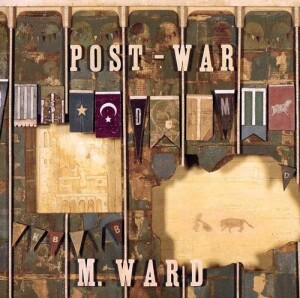 M. Ward is on a roll. With Post-War, he has released his fifth full-length CD (third for Merge), and against all odds he keeps getting better. He’s still recognizably the same singer-songwriter he was on his first, Duets for Guitars No. 2, but he has grown and matured as an artist. He’s still traveling the same musical road, but with every release he has come up with a different angle from which to view that particular lovelorn landscape.
M. Ward is on a roll. With Post-War, he has released his fifth full-length CD (third for Merge), and against all odds he keeps getting better. He’s still recognizably the same singer-songwriter he was on his first, Duets for Guitars No. 2, but he has grown and matured as an artist. He’s still traveling the same musical road, but with every release he has come up with a different angle from which to view that particular lovelorn landscape.
The territory M. Ward covers is the full Americana map: based on delta blues, richly indebted to the work of John Fahey (a 2006 tribute to whom, I Am The Resurrection Ward co-produced), and also giving a nod to Gelb’s fondness for wordplay and sonic experimentation. Other influences range from Motown to Bakersfield, Beatles to Beach Boys to Bowie. Toss it all in a blender, add plenty of reverb and make it sound like it’s playing on an ancient turntable, and you have Ward’s latest release.
Post-War, though still mostly recorded in small Portland studios, for the first time enlists a full band – including two drummers – on many of the tracks, so it’s sonically more rich in some ways than his previous work. Nowhere is this more evident than on his cover of Daniel Johnston’s “To Go Home,” a rocker that features both Rachel Blumberg and Jordan Hudson on drums, Ward’s longtime musical partner Mike Coykendall on bass and Neko Case on backing vocals.
But I’m getting ahead of myself. This album starts off almost ugly, with Ward before the acoustic guitar even sounds a note, croaking “One … one … one … sip won’t do,” as he launches into “Poison Cup,” an ode to obsessive love. By the time it’s over, it has risen from that humble beginning to become a thing of beauty. Amanda Lawrence’s violin and viola have joined Skip Von Kuske’s cello and bass for a string quartet – sounding a bit like a Mellotron on a ’60s pop record – into a semi-symphonic wall-of-sound climax, complete with timpani. Now that’s something different for M. Ward. Then it’s right into “To Go Home,” and finally we get what we expect from this guy on “Right In The Head,” a folksy ballad featuring strummed acoustic guitar, those reverb-laden vocals and crackly-vinyl sounds … but after the first verse and chorus, there’s a southern-rock double-electric-guitar attack. Oh, yeah.
The disc is about evenly divided between up-tempo and slower songs. Among the best of the former is “Requiem,” a rattling track that builds from a quiet acoustic song built on bluesy slide guitar into another electric rave-up. This one is vintage Ward lyrically, with its repeated evocation of “he was a good man and now he’s gone,” made all the more compelling by dueling drummers and dueling lead guitar lines, all of which is reminiscent of All Things Must Pass-era George Harrison.
“Magic Trick,” on which Ward matches guitar licks with Jim James (My Morning Jacket), is a rockabilly treat about a female with commitment phobia; James and Ward provide a layered chorus of backing vocals, which are augmented by an archival audience track. In a similar vein is “Rollercoaster,” a lazy, Lovin’ Spoonful-inspired bit of acoustic folk rock with Gelb-inspired piano.
Among the additional standouts is “Chinese Translation,” a wonderfully catchy folk ballad, a fable about the cyclical nature of humanity’s quest for wisdom. A young man approaches a mountain-top sage with three questions, which form the immediately hummable chorus: “What do you do with the pieces of a broken heart? / and how can a man like me remain in the light? / and if life is really as short as they say / tell me, why is the night so long?” Again, vintage Ward and quite moving in execution.
The title track is an enigmatic slow number pondering the war between the sexes, “Eyes on the Prize” is languid and bluesy with a sleepy conga beat; “Today’s Undertaking” injects biblical imagery into a love song shaped by a lovely violin-viola arrangement; and the short and sweet “Afterward” is backed by great big organ chords, and is paired with “Rag,” an outro of solo acoustic guitar. The other instrumental, “Neptune’s Net,” is another Ward-trademark tune featuring layered guitars, with an appropriate Hawaiian-style slide playing the melody.
The album’s overarching theme is a bit less obvious than Transistor Radio‘s homage to the lost golden age of radio. The title is a tantalizing clue to an attitude that’s a bit more positive toward romance; perhaps even some satisfaction in a current relationship? Either way, the songs generally have a short intro, say their piece and end with little fanfare. That doesn’t mean they don’t pack an emotional punch; in fact, Ward’s songwriting is definitely getting sharper with time. Post-War is one of the year’s best alt-Americana releases.
(Merge, 2006)
